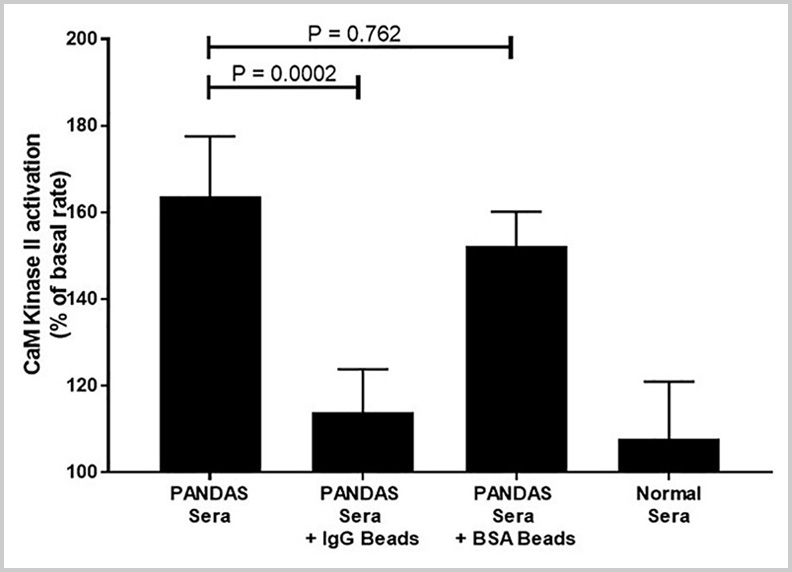Antineuronal biomarkers help diagnose encephalitis in children
Cunningham Panel™ antibody test successfully identifies acute illness in Sydenham chorea and PANDAS patients.

In this newly published study, Dr. Madeleine Cunningham and colleagues examine whether anti-neuronal biomarkers, when used as a group, confirm acute disease in Sydenham chorea (SC) and pediatric autoimmune neuropsychiatric disorder associated with streptococcal infections (PANDAS), a type of post-infectious encephalitis in children. The results strongly suggest that both PANDAS and Sydenham Chorea are provoked by cross reactive anti-neuronal antibodies.
Elevated autoantibody results measured by the Cunningham Panel in this study included Dopamine D1 receptor (DRD1), Dopamine D2L receptor (DRD2L), Lysoganglioside (GM1), and Tubulin. Elevated CaMKII activation suggests that antineuronal antibodies have functional significance.
“Our results suggest that the panel of four antineuronal antibodies and CaMKII activation assays successfully identify acute illness in PANDAS, providing opportunities for rapid and accurate diagnosis and treatment.”
- Autoantibodies present in the CSF of PANDAS patients (although lower than in sera) are evidence of neuronal inflammation during symptomatic episodes and demonstrates the ability of these auto-antibodies to cross the blood brain barrier and potentially bind to neuronal antigens. 1
- Children diagnosed with PANDAS demonstrated antibody-mediated CaMKII enzyme activation at a mean of 150% (range = 115-198%) and those with Sydenham chorea had CaMKII activation of 221% (range = 194-249%) compared to normal control subjects with a mean CaMKII activation of 93% (range = 72-112%).
- At six months follow-up, patients who saw symptom improvement also saw a decrease in autoantibody titers.
- Results confirm previously published studies which indicate antineuronal antibody biomarkers and CaMKII activation may be a useful adjunct to clinical diagnosis of Sydenham chorea, PANDAS and related disorders and are the first known group of autoantibodies detecting dopamine receptor-mediated encephalitis in children.
- Evaluation of these data demonstrate that certain antineuronal antibody or CaMKII activation tests were more likely to be positive in certain pathologies. This observation may be significant in the future understanding of basal ganglia encephalitis.
Author’s Take:
Digital Information Packet
Interested in learning more about infection-induced autoimmune encephalopathies, such as PANS/PANDAS? We have compiled a list of materials including journal articles and videos that may be helpful to you. Enter your email address below to get access to these articles.
1 Chain Jennifer L., Alvarez Kathy, Mascaro-Blanco Adita, Reim Sean, Bentley Rebecca, Hommer Rebecca, Grant Paul, Leckman James F., Kawikova Ivana, Williams Kyle, Stoner Julie A., Swedo Susan E., Cunningham Madeleine W. “Autoantibody Biomarkers for Basal Ganglia Encephalitis in Sydenham Chorea and Pediatric Autoimmune Neuropsychiatric Disorder Associated With Streptococcal Infections.” Frontiers In Psychiatry, vol. 11, 2020, p. 564., doi: https://www.frontiersin.org/article/10.3389/fpsyt.2020.00564





